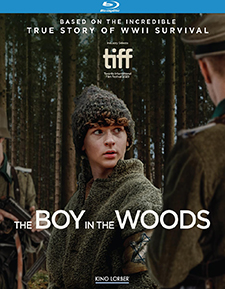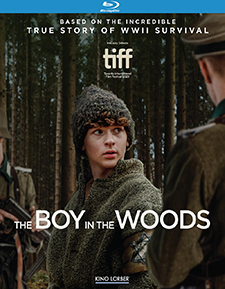Boy in the Woods, The (Blu-ray Review)

Director
Rebecca SnowRelease Date(s)
2023 (October 15, 2024)Studio(s)
Lumanity Productions/JoBro Productions/Undisputed Pictures/Photon Films (Kino Lorber)- Film/Program Grade: A
- Video Grade: A
- Audio Grade: A
- Extras Grade: D
Review
Films about the Holocaust are often excruciatingly grim as they portray the inhuman persecution of European Jews by the Nazis. Based on a true story, The Boy in the Woods is both harrowing and exhilarating, avoiding explicit images of human suffering while making clear the terror of one Jewish boy trying to elude capture by hiding in a tenuous sanctuary.
In Nazi-occupied Poland, 12-year-old Max (Jett Klyne, Doctor Strange in the Multiverse of Madness) and his mother and younger sister are rounded up for deportation. Urged by his mother, Max escapes to find his aunt, who arranges for him to hide with a Christian family on their small farm. The farmer, Jasko (Richard Armitage, Captain America: The First Avenger), conceals Max in plain sight as his nephew. Nosy neighbors are suspicious of the boy.
After a Gestapo officer (Christopher Heyerdahl, The Calling) visits the farm and questions Jasko and Max, Jasko knows it’s too dangerous to keep Max, not only for the boy but also for himself, his wife, and their daughter. He teaches the boy some basic survival skills and takes him to a hiding place in the woods that will shelter him from prying eyes and Nazi soldiers.
Max undergoes hardships of weather, roaming Jew hunters, and hunger. One day, he encounters another orphaned boy, Janek (David Kohlsmith, Shazam!). Max, older and stronger than Janek, feels responsible for keeping him safe, and comforts him with the legend of the Golem, a giant creature made of mud who protected Jews. Their lives become even more complicated when they come across a baby amid a group of dead bodies. If they save the baby, will its crying draw unwanted notice? How can they care decently for a baby?
Max is fully aware of the danger that may lurk around the next tree, yet refuses to let the gravity of his situation get the better of him. He fights to survive driven by the hope of one day reuniting with his family. The woods contain many dangers, from poisonous mushrooms to men with guns tracking Jews in hiding, but it’s their only hope of survival, where they can forage, hunt, and use their imagination to keep their minds off a cruel reality.
Young Jett Klyne dominates the film and for a long stretch is the only character on screen. He conveys strength, resistance, and determination to survive, which makes his Max all the more heartbreaking. Much of his performance is through facial expression and body language, since silence in the woods is his protector. That he accepts his lot and does what he must to see his mother and sister again is especially sad, since their fates are in the hands of the Nazis.
Jasko is a man of few words with a sense of decency. Armitage coveys strength, compassion, and intelligence. He may be a simple man, but his values are above reproach. Though it would be easier to refuse the boy sanctuary, Jasko takes him in, even creating a back story for the boy, insisting that he memorize it. Armitage communicates much in his expressions. You can tell exactly what he’s thinking as he weighs the risks of his actions. His rugged, quietly powerful performance adds gravity, balancing it with Max’s life-or-death jeopardy in the woods.
Director Rebecca Shaw and director of photography Adam Madrzyk portray the forest as a self-contained world filled with peril but at times magical, far removed from the war raging outside its branches dancing gently in the breeze. In some scenes, with overcast skies, you can practically feel the chill in the air as winter approaches. Though the period is near the end of World War II, we see only a brief early sequence in a concentration camp. The front lines of battle are far off, though cannon fire can be heard late in the film as the Russians move into the territory and rout the Germans. There’s constant tension as Max can be captured at any moment. His only ally is the forest.
An epilogue tells us what happened to Max after the events in the film, and then the real Maxwell Smart is shown in a touching coda as an elderly man reuniting, decades later, with an individual whose fate he never stopped wondering about.
The Boy in the Woods was captured digitally by director of photography Adam Madrzyk using Sony Venice cameras with an aspect ratio of 2.00:1. Contrast and clarity on the Blu-ray are excellent. Outdoor scenes on the farm were shot under an overcast sky, which gives the film a somber atmosphere. Scenes in the woods, by contrast, are often dappled with sunlight and suggest a world apart from the horrors beyond. Max’s light-colored shirt and pants get dirtier as his stay gets longer. The color palette tends toward earthy hues, but the brilliant green of the forest’s trees stands out from the otherwise drab shades. In a night scene in a rainstorm, many details are hard to see and Max’s face appears in a near void of blackness.
There are three audio track options: English 2.0 and 5.1 DTS-HD Master Audio, and English Audio Description. English SDH subtitles are available. Dialogue is clear and sharp. The sound design creates suspense with every broken branch, rustling of leaves, distant voice, gun shot, or heavy breathing signaling possible discovery. An unexpected visit from a Gestapo officer creates a gripping scene in which silence heightens suspense. The score by Julia Kent is low-key and never takes focus away from the action. Its tone is somber, with a sense of yearning.
The only bonus materials on the Blu-ray release from Kino Lorber include the following:
- Trailer (2:32)
- The Throwback Trailer (2:21)
The Boy in the Woods is a captivating tale about a young person’s survival in a world that marked him as an undesirable to be rounded up and murdered. Told from the child’s point of view, the film is a powerful comment on intolerance and hatred, yet director Rebecca Snow presents an uplifting tale of perseverance under enormous pressure. Jett Klyne and Richard Armitage convey constant fear of discovery even as their characters try to make a terrifying situation bearable.
- Dennis Seuling

